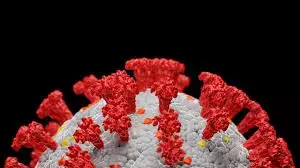- Home
- Medical news & Guidelines
- Anesthesiology
- Cardiology and CTVS
- Critical Care
- Dentistry
- Dermatology
- Diabetes and Endocrinology
- ENT
- Gastroenterology
- Medicine
- Nephrology
- Neurology
- Obstretics-Gynaecology
- Oncology
- Ophthalmology
- Orthopaedics
- Pediatrics-Neonatology
- Psychiatry
- Pulmonology
- Radiology
- Surgery
- Urology
- Laboratory Medicine
- Diet
- Nursing
- Paramedical
- Physiotherapy
- Health news
- Fact Check
- Bone Health Fact Check
- Brain Health Fact Check
- Cancer Related Fact Check
- Child Care Fact Check
- Dental and oral health fact check
- Diabetes and metabolic health fact check
- Diet and Nutrition Fact Check
- Eye and ENT Care Fact Check
- Fitness fact check
- Gut health fact check
- Heart health fact check
- Kidney health fact check
- Medical education fact check
- Men's health fact check
- Respiratory fact check
- Skin and hair care fact check
- Vaccine and Immunization fact check
- Women's health fact check
- AYUSH
- State News
- Andaman and Nicobar Islands
- Andhra Pradesh
- Arunachal Pradesh
- Assam
- Bihar
- Chandigarh
- Chattisgarh
- Dadra and Nagar Haveli
- Daman and Diu
- Delhi
- Goa
- Gujarat
- Haryana
- Himachal Pradesh
- Jammu & Kashmir
- Jharkhand
- Karnataka
- Kerala
- Ladakh
- Lakshadweep
- Madhya Pradesh
- Maharashtra
- Manipur
- Meghalaya
- Mizoram
- Nagaland
- Odisha
- Puducherry
- Punjab
- Rajasthan
- Sikkim
- Tamil Nadu
- Telangana
- Tripura
- Uttar Pradesh
- Uttrakhand
- West Bengal
- Medical Education
- Industry
COVID-19 infection may accelerate progression of pre-symptomatic type 1 diabetes to clinical disease among youth: JAMA

COVID-19 infection may accelerate the progression of pre-symptomatic type 1 diabetes to clinical disease among youth suggests a new study published in the JAMA.
The aim of this study was to develop strategies that identify children from the general population who have late-stage presymptomatic type 1 diabetes and may, therefore, benefit from immune intervention. They tested children from Bavaria, Germany, aged 1.75–10 years, enrolled in the Fr1da public health screening programme for islet autoantibodies (n=154,462). OGTT and HbA were assessed in children with multiple islet autoantibodies for diagnosis of presymptomatic stage 1 (normoglycaemia) or stage 2 (dysglycaemia) type 1 diabetes.
Cox proportional hazards and penalised logistic regression of autoantibody, genetic, metabolic and demographic information were used to develop a progression likelihood score to identify children with stage 1 type 1 diabetes who progressed to stage 3 (clinical) type 1 diabetes within 2 years. Results Of 447 children with multiple islet autoantibodies, 364 (81.4%) were staged. Undiagnosed stage 3 type 1 diabetes, presymptomatic stage 2, and stage 1 type 1 diabetes were detected in 41 (0.027% of screened children), 30 (0.019%) and 293 (0.19%) children, respectively. The 2 year risk for progression to stage 3 type 1 diabetes was 48% (95% CI 34, 58) in children with stage 2 type 1 diabetes (annualised risk, 28%). HbA, islet antigen-2 autoantibody positivity and titre, and the 90 min OGTT value were predictors of progression in children with stage 1 type 1 diabetes. The derived progression likelihood score identified substages corresponding to ≤90th centile (stage 1a, n=258) and >90th centile (stage 1b, n=29; 0.019%) of stage 1 children with a 4.1% (95% CI 1.4, 6.7) and 46% (95% CI 21, 63) 2 year risk of progressing to stage 3 type 1 diabetes, respectively.
Conclusions/interpretation Public health screening for islet autoantibodies found 0.027% of children to have undiagnosed clinical type 1 diabetes and 0.038% to have undiagnosed presymptomatic stage 2 or stage 1b type 1 diabetes, with 50% risk to develop clinical type 1 diabetes within 2 years.
Reference:
Friedl N, Sporreiter M, Winkler C, et al. Progression From Presymptomatic to Clinical Type 1 Diabetes After COVID-19 Infection. JAMA. Published online July 15, 2024. doi:10.1001/jama.2024.11174
Dr. Shravani Dali has completed her BDS from Pravara institute of medical sciences, loni. Following which she extensively worked in the healthcare sector for 2+ years. She has been actively involved in writing blogs in field of health and wellness. Currently she is pursuing her Masters of public health-health administration from Tata institute of social sciences. She can be contacted at editorial@medicaldialogues.in.
Dr Kamal Kant Kohli-MBBS, DTCD- a chest specialist with more than 30 years of practice and a flair for writing clinical articles, Dr Kamal Kant Kohli joined Medical Dialogues as a Chief Editor of Medical News. Besides writing articles, as an editor, he proofreads and verifies all the medical content published on Medical Dialogues including those coming from journals, studies,medical conferences,guidelines etc. Email: drkohli@medicaldialogues.in. Contact no. 011-43720751


